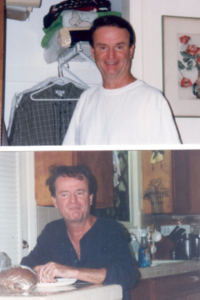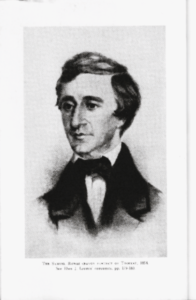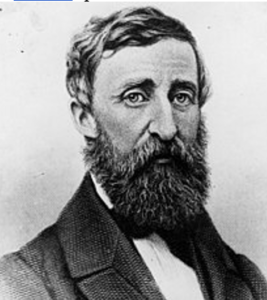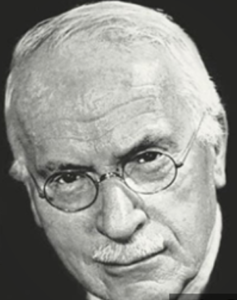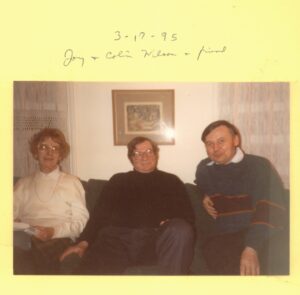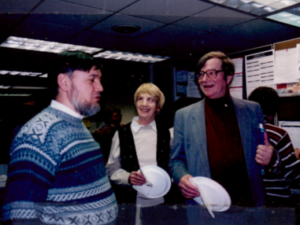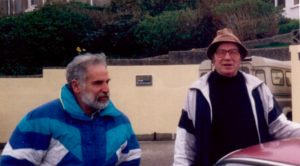
Bob and Colin in Cornwall, 2000
When Bob died in January, 2019, Publishers Weekly, the industry’s trade journal, described him as “founder of Rainbow Ridge Books and longtime publisher of works of spirituality and metaphysics.” True enough, but hardly a fair assessment. I wrote about him here, on January 8, 2019, in a post I titled “Thinking about Bob”:
We live in a culture that fears death and seems to think that death is tragedy. When you really think about it, that’s a weird idea, which as much as says that life is a failure in that it ends.
Death is an ending, yes, but it is not a tragedy, just a natural culmination. However, still it is an ending, and there’s no talking it away.
&&&
I’m thinking these thoughts because my friend, publisher, and longtime partner in Hampton Roads, Bob Friedman, died on Monday the seventh, just a few weeks shy of his 77th birthday. He died of a relatively short illness which was apparently painless, not a bad way to go.
He leaves behind not only his beloved companion Beth Hines, and his four children, but friends too many to count, and a rich legacy of books.
Bob founded or co-founded no fewer than three publishing companies (The Donning Company in 1974, Hampton Roads Publishing Company in 1989, and Rainbow Ridge Books in 2009) and, in a career spanning more than 40 years, published more than 1,000 books.
Mary Summer Rain, Mary Elizabeth Marlow, Winter Robinson, Neale Donald Walsch, John Nelson, and so many others: Bob gave them their first chance. Without him, would they ever have found a sympathetic publisher? Without their books, would thousands of people have received the encouragement and inspiration they needed? And what of the people that these people may inspire and encourage in turn?
Certainly he changed my life! Changed, enriched, complicated, provoked, encouraged, facilitated…. Anything I accomplished as editor or author, I accomplished because Bob and I teamed up to start a publishing house. Anybody I encouraged came out of that base, which means it is a secondary effect of Bob’s life. You see the point, there’s no end to it.
For that matter, it was Bob’s idea that he and I do Gateway together in December, 1992, and put the cost on the company. The consequences that flowed from that decision make up an entirely different but equally important chain of influences.
There is no way to estimate this one man’s influence, because for one thing we will never see the end of it. Seems to me there’s an encouraging lesson there for all of us.
The next month, I posted this, saying in part:
“For someone of his reach and influence, Bob was surprisingly modest about his potential abilities. I used to say to him, “Bob, you could contact anyone in the New Age movement with two phone calls,” which was no exaggeration but merely a statement of fact, but sometimes he seemed to doubt it. Yet look at his track record: Our very first book at Hampton Roads — the book that returned our capital and gave us enough money to get us going — was Linda Goodman’s 1,100-page novel in blank verse Gooberz. Our second, Tapping into the Force.
“Whose personal interaction got those authors, if not Bob’s? Certainly not mine!
“I can’t help wondering, for the actor whose last role was Bob Friedman, what’s next. Hard act to follow.”
In April, I posted an impression from the memorial service held at the auditorium of the Association for Research and Enlightenment (A.R.E.) in Virginia Beach. Excerpts from that post:
“If all his friends who live far away could have been there, the place would have been too small. If all his friends living and dead had been able to attend, we would have needed a much larger auditorium. Bob was a man who made many friends, and kept them.
“If, in addition, we had had all the people whose lives he vitally affected, via the authors he published, a large football stadium would have been too small. (Hyperbole? Well, consider the effect on society of just three authors out of the hundreds he put into print: Mary Summer Rain, Neale Donald Walsch, and Lynn Grabhorn.) His was a momentous life.”
I pointed out that Bob and I were “friends and adversaries and friends again over a period of 32 years. For 20 years we built Hampton Roads Publishing Co. Inc. together, and after that … he published eight of my books. It was a long many-faceted relationship, much of it invisible to others, like our periodic lunches over the years…. Our talk might range into history or literature or metaphysics, because Bob was an educated man, not a narrow-focus specialist. And of course there was always the world of publishing to discuss, or deplore.”…
“After an invocation and a buffet meal, we all sat and heard a succession of 20 people talk about various aspects of Bob’s life as they had experienced it. Twenty speakers: It sounds deadly, but in fact it was fascinating, as it always is when people speak from the heart.
“Again and again and again, we heard of Bob’s receptivity, and his kindness, and how his helpfulness to others changed their life. Again and again and again we heard first-hand testimony to – well, there’s no better word for it – his goodness.
“Goodness is undervalued in this world, as you can see by looking around you, but it is certainly properly valued when encountered. And that was Bob. I knew him perhaps as well as anyone beyond his family members, and I can say that in 32 years I never saw him do a malicious thing, never even heard him express a malicious thought. This isn’t just conventional “of the dead say nothing but good” rhetoric. It’s true. Not once. Bob as a business partner could be aggravating beyond all precedent (and I’m sure he would say the same of me) but I never worried about him acting out of malice. He just didn’t.”
I was the final speaker, so I mostly confined myself to a few points that complemented what others had said. Among the things I mentioned:
- Bob’s consistent lack of communication. I told how one day Ginna Colburn, our other partner, said, “Bob, you’ve got to communicate!” and he had grumbled, in response, “People have been telling me that my whole life,” and we had said, “Well?” It got a laugh, because everybody recognized that trait in him.
- Bob’s metaphysics was never dependent upon the state of his bank account. I told of a time in our early days when I went into his office and said I was tired of us just scraping by. He said it was strange, because he always was programing for us to have enough. (The answer, we suddenly realized, was to program for us to have more than enough. and shortly thereafter came Conversations with God.) The point is, Bob didn’t just give lip service to our beliefs, he relied upon their being real. Not everybody does!
- I mentioned his influence on the world at large, via the endless chain of consequences that follow as one person is inspired by a book and in turn goes on to inspire others.
- Finally, I said that even we who knew him well could not really see this full stature yet. It takes time. “But, he was a great man.”
I ended that post saying it was over-long . “Bob was a great man, and transformed many lives, my own not least, and will be fondly remembered.” But I find that in fact there’s more to be said. I’ll try that tomorrow.
